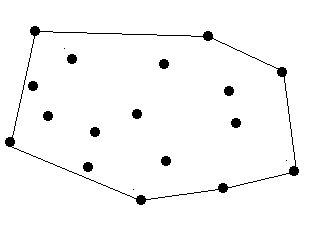Surround the Trees
Time Limit: 2000/1000 MS (Java/Others) Memory Limit: 65536/32768 K (Java/Others)
Total Submission(s): 13364 Accepted Submission(s): 5178
Problem Description
There
are a lot of trees in an area. A peasant wants to buy a rope to
surround all these trees. So at first he must know the minimal required
length of the rope. However, he does not know how to calculate it. Can
you help him?
The diameter and length of the trees are omitted, which means a tree can be seen as a point. The thickness of the rope is also omitted which means a rope can be seen as a line.

There are no more than 100 trees.
The diameter and length of the trees are omitted, which means a tree can be seen as a point. The thickness of the rope is also omitted which means a rope can be seen as a line.

There are no more than 100 trees.
Input
The
input contains one or more data sets. At first line of each input data
set is number of trees in this data set, it is followed by series of
coordinates of the trees. Each coordinate is a positive integer pair,
and each integer is less than 32767. Each pair is separated by blank.
Zero at line for number of trees terminates the input for your program.
Zero at line for number of trees terminates the input for your program.
Output
The minimal length of the rope. The precision should be 10^-2.
Sample Input
9
12 7
24 9
30 5
41 9
80 7
50 87
22 9
45 1
50 7
0
Sample Output
243.06
分析:Graham扫描法。

#include<cstdio> #include<cstring> #include<algorithm> #include<cmath> using namespace std; struct Node{ double x,y; }p[200]; int N,top; int res[200]; bool cmp(Node A,Node B)//按极角排序,极角相同时比较与极点的距离 { if(A.y==B.y) return A.x<B.x; return A.y<B.y; } bool mult(Node sp,Node ep,Node op) {//"右拐"返回1,元素出栈 return (sp.x-op.x)*(ep.y-op.y)>=(ep.x-op.x)*(sp.y-op.y); } void Graham() { sort(p,p+N,cmp); top=1; int len; if(N==0) return;res[0]=0; if(N==1) return;res[1]=1; if(N==2) return;res[2]=2; for(int i=2;i<N;i++) { while(top&&mult(p[i],p[res[top]],p[res[top-1]])) top--; res[++top]=i; } len=top; res[++top]=N-2; for(int i=N-3;i>=0;i--) { while(top!=len&&mult(p[i],p[res[top]],p[res[top-1]])) top--; res[++top]=i; } } double mul(double x1,double y1,double x2,double y2) { return sqrt((x1-x2)*(x1-x2)+(y1-y2)*(y1-y2)); } int main() { while(scanf("%d",&N)&&N) { for(int i=0;i<N;i++) scanf("%lf%lf",&p[i].x,&p[i].y); Graham(); int s; for(s=0;s<top;s++) if(!p[res[s]].x&&!p[res[s]].y) break; double ans=0; for(int i=s+1;i<top;i++) ans+=mul(p[res[i-1]].x,p[res[i-1]].y,p[res[i]].x,p[res[i]].y); for(int i=1;i<=s;i++) ans+=mul(p[res[i-1]].x,p[res[i-1]].y,p[res[i]].x,p[res[i]].y); printf("%.2f ",ans); } return 0; }
